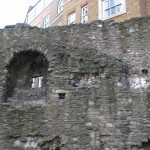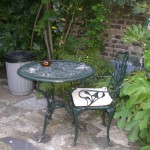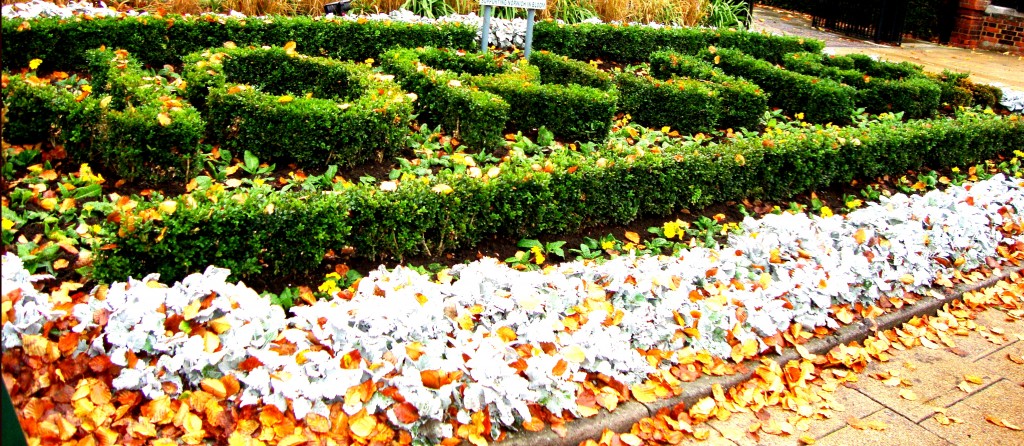
Before I came to Norwich, I expected it to be a small town with not much to offer a big city girl like me. As an English major and art minor, I have always been interested in the arts. But in New York, and even sometimes at Dickinson, arts events like small music gigs or poetry readings are all kept in a need-to-know or who-you-know circle. When I first arrived in Norwich one of the first few ‘local’ people I met was Stephanie Leal, one of our tours guides for the tour of Norwich. As a published poet, Stephanie told me and a few of my literary friends about the monthly poetry readings at the pub the Birdcage. I went to one of these within my first month here and loved it. As cliché as it sounds, I found being surround by so much creativity and talent really inspiring for my own artistic pursuits.
When it came time to choose something as my ‘Experience’ in Norwich, it wasn’t hard for me to pick out my interests. I knew the Birdcage was great and wanted to pursue the poetry/arts scene in Norwich. But it wasn’t until I began spending time researching and making connections here that I realized how huge the arts scene in Norwich really is. Now, you may be thinking, New York City must have a big arts scene, bigger than Norwich! And while that may be true, it’s hard to make connections with ‘local’ poets in New York. By the time most people get to New York, they are already up-and-coming. Tickets sell out fast, most of the good arts scene is underground, and you have to know how to look for it. And honestly I don’t. But in Norwich few events sell out too quickly and even well known successful poets, like the members of Aisle 16, have time to chat with a uni student like me.
Following the performing arts scene in Norwich led me to discover the Norwich Arts Centre, which holds concerts and various music shows as well as some art exhibits, and the live music at the Black Horse Pub during March. I also got to spend more time at the Birdcage readings. There were also more events and venues I just didn’t have the time to attend. There are various concerts held at the Waterfront and prose and poetry readings at Jurnet’s Bar Wensum Lodge from October to March as part of a series called Café Writers. Art is bursting from Norwich, all you have to do is look.
Besides attending all these great events, my project taught me to appreciate a lot more live music than I used to. I learned that artists of all kind are people who are accessible and want to share their experiences. Through my interview with Aisle 16 I found out about the differences between performance and printed poetry. Several of the members of Aisle 16 graduated from UEA. I began to realize that artists aren’t born out of a vacuum with the ability to create beautiful and moving works. Instead, artists are people who went to school, met up, shared passions, and created together. My exploration of Norwich arts help to inspire me in my own artistic endeavors. Here at UEA, back at Dickinson College, and at home in New York, opportunities are there, people are interested, and creativity can be found all around—even in a small town like Norwich.
Tags: Megan

Image Credit: http://www.thebirdcagenorwich.co.uk/Gallery.aspx
Image Credit: http://www.thebirdcagenorwich.co.uk/Gallery.aspx
This month’s Cabaret at the Birdcage, on 24 of March, was a little different from the past few I’ve attended. Since it fell over UEA’s Easter Holiday, the line up was mostly adults—and my flatmate, of course. The performance began with Christine York. What to say about Christine? Well, her opening piece was entitled, “Punk Rock Granny.” And that she was. To be honest, I was glad when her series of poems on elderly sex and proper table manners were over. She was followed by the debut reader Jill Dean, reading the work of her mother’s boyfriend, John Simms. Simms’ poems touched on poignant memories of love and family members. This brought the mood of the show back down to what I had expected. Following this was my flatmate, L. Eaves. Beginning with a new piece of his, “Gallows Humour,” which dealt with finding the humour, irony, and sadness of death. Then of course there was the old classic that all L. Eaves fans know and love, “Grumpy at 20,” which professes the desires of a grumpy 20-year-old not to party, drink, or enjoy loud frivolous activities.
After this the mood of the show changed yet again. How to describe what followed? Andy Sprag was due up next, but due to…something…he was unable to attend. In his absence he sent along a cassette tape to be played. The cassette tape blared at full volume, essentially white noise in the form of odd gospel-singing-stuff. No poetry. None of Andy’s singing. Just this bizarre white noise gospel like music. Next up was Adam with poems that twisted fairy tales, Megan Pervis (a fellow American, from California) who performed solemn more serious poetry, including a poem entitled, “Non Journey,” and comedienne Amy Nickelson with amusing thoughts on contraception. The finishing act was, yet again, something totally unexpected and mood changing. Will Averill took the stage and explained that he loved Irish folk music and gangsta rap. To further illustrate this point, Will performed his first poem in a mixture of folk and rap. He followed with his poem “Smurfette,” and closed with some audience participation. Which I hate. It consisted of some groups yelling, “THE POPE,” and others, “THE GAYS.” I think you get the picture.
Overall the eclectic line-up provided for a reasonable show. Not quite the level of performance usually found at the monthly Birdcage Poetry Cabaret, but still worth the single pound the show costs. I recommend these performances every time!
Hours: 2.5
Total: 12.5 (and done!)
Tags: Megan
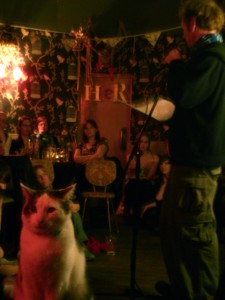
The Birdcage resident cat and Russell J. Turner hosting
Last week, I attended the every third Wednesday of the month poetry Cabaret, HEADCRASH, run by local poet, Russell Turner. It features other local poets in the small coffee shop atmosphere of The Birdcage Pub.
This month’s cabaret featured a phenomenal line-up. It began with the prose pieces by Cora Benzie, who began by offering the disclaimer that the male narrator of her pieces was not her. Normally prose performed drags on and is a bit hard to follow, but not this. Not only was it edgy and enthralling, but the short length and detailed narrative made it easy to follow. Next up was Roger the Zombie who seemed to do a stand-up comedy rant against everything… followed by John William Brown who read some poignant post Valentine’s Day poems. Unlike most poems of this holiday, these touched on the loss of loved ones and the love of family members. Then the host, Russell J. Turner stepped into the line-up to fill in a for a few people who couldn’t make it. He performed a piece inspired by words found on a random generator—the idea was credited to Tim Clare of Aisle 16, who I talked about in my past entry. After a short drink break, the show ended with two final acts: Stevie Watson and Hannah Jane Walker. Watson performed, among other pieces, a poem called, “Technology Scares Me.” She also had the most amazing English or something accent ever! Walker closed with a large group of poems ranging from pieces about apologies to all the things that you want to tell the person you care about, but instead you are a jerk.
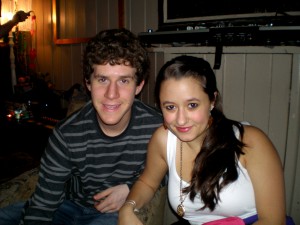
Andrew accompanied me and actually enjoyed poetry!
All in all, the line-up and performance was great. But the best thing about the whole event was not the performance, but the fact that I got to successfully introduce poetry to my friend, Andrew Barron. Thanks for coming Andrew, and I am so glad you had a good time! In the future, The Birdcage holds events every Wednesday, which rotate between music poetry, and comedy. I definitely recommend checking it out! It is only a pound to sit on couches and watch the show!
Hours: 2.5
Total Hours: 5.5
Tags: Megan
February 18th, 2010 · 1 Comment
Interview with John Osborne, member of Aisle 16**
On Monday night, at the Norwich Arts Centre, I got to play member of the press. Showing up for my interview with Aisle 16, I bought my ticket for the show and asked at the front desk where I could find the poetry group for their interview. They sent my name back, and I got escorted into the performance area not only for my interview, but o see a little tech setup behind the scenes action (pretty cool). There, I spent some time talking with John Osborne, of Aisle 16.
Since my arrival in Norwich I have noticed that there is a very accessible and large poetry scene here. Osborne gave several reasons he thought that Norwich was unique. The first is UEA, which brings a lot of good caliber writers to Norwich. The second is the Bird Cadge which opened in 2006 when Osborne was a student at UEA. While Osborne admitted, “I can’t really say how it’s different since I don’t know a lot of other areas,” he was willing to say, “it’s better than other areas and when people come to t he area they are impressed with it.”
In the history of Norwich and East Anglian poetry there is a long line of rural and agricultural poetry. But Aisle 16’s poetry, and the contemporary poetry in Norwich has moved significantly away from that. Osborne suggested that this is because poets write about what they know, what touches and influences them on a daily basis. For those poets, farming was central to their lives, but today that average person in East Anglia may never visit a farm.
I asked Osborne how Norwich and UEA influenced his experience with poetry. He admitted, “I really didn’t have any knowledge of poetry. I liked song lyrics but I had never heard of performance poetry until my time at UEA. I learned about performance poetry from my friends and people I met at UEA.” This is just another way that the contemporary Norwich poetry has changed from the time of Bloomfield and other historic East Anglian Poets. With the university there begins a learning process and collective exploration that was not there before.
In my studies of East Anglian poetry, and poetry in general, I have always been more familiar with the published and printed poetry rather than the spoken word poetry. When asked to comment on this Osborne suggested that performance poetry is a cross between stand-up comedy and poetry. There are some live poems he would never publish because they just don’t look good on paper. But when you hear them, they are brilliant. Others don’t sound as good, they might be really depressing and people just don’t want to hear that. You always have to keep in mind your audience. But hopefully a poet’s persona as a published poet and a performance poet is not too different. He offered an analogy to a vendiagram to explain this. One circle is you when you perform, the other is you when you write. The center overlap is your identity as poet. The bigger the center the better more successful poet you will be.

Osborne's vendiagram of poetry
When asked the classic chicken-egg question: what came first, the poetry or the theme of the show? Osborne explained that in this case the theme of ‘going home’ came first, and the poetry was written around that, but that that is not always the case. With the publication of Aisle 16 book, Live from the Hellfire Club, Osborne noted that they would still consider themselves a performance poetry over a written poetry group.
Finally, for all you aspiring poets out there, Osborne’s big piece of advice is to write everything down. Keep a notebook by your bed and write down all your ideas, even if they are just words or sentences. Because, as Osborne explains, the blank page can be hard to conquer and it is much easier to start with some old ideas.
**Please note that despite the use of quotations this post is a paraphrase of what was said during the interview with John Osborne
The Show: Local Boys Done Good
The show itself was fantastic. It combined both the spoken word of the poets and various videos and music which flashed and played on a large projector screen behind them. It opened with a piece on the awkward teenage years, by Tim Clare, which he performed at the UEA Grad Bar the week before. Then, Aisle 16 members Ross Sutherland, Joe Dunthorne, and Chris Hicks performed an interactive poem called, “Raise Your Status,” which, as the title suggests, offered various comical ways to raise your status. But both these acts served simply as an introduction to the real show.
After the break, Sutherland introduced the theme of the show by defining ‘home.’ He touched on Freud’s Beyond the Pleasure Principle, and used a circular diagram to describe the progression of the hero after he’staken away from home as he seeks to return home. However, Sutherland asked what would happen if suddenly the diagram was flipped, and home was on the dark uncertain side of the circle, and we were trying to escape home rather than return to it? I found this very moving, especially when he said, “Home is the place that knows us better than anywhere.”

The cycle of leaving and returning home
After this introduction each member of the group discussed their experiences performing in their hometowns, while a video clip played behind them. Each member also performed the piece they wrote for their hometown.
John Osborne, first performed his piece “Local Boys Done Good” in the town hall of his hometown in Brigg. Ross Sutherland wrote “When Paper Boys Roam The Earth” about his hometown Coggeshall Essex and performed it in the Chapel Pub there. Joe Dunthorne read his poem about the rough nature of the city Swansea in Wales where he grew up entitled, “Wild Wild West.” Chris Hicks grew up in Quarley, Hampshire. Unlike the performers before him, Hicks had a terrible time doing the show for his hometown and called it one of the “worst experiences of his life.” He performed two poems, “Monkstone Demands 20” about the neighboring town, and “Yesterday Reenactment Society.” And last but not least, the show closed with Tim Clare who explained his experience going home where he realized, “My hometown had done better than I had.” Because the town had done so well, the only venue he could book for him hometown show was the playhouse. And to close the show, Clare performed a touching song (which unfortunately I cannot find a video of) on a ukulele called, “Think of England.”
The show offered something for everyone: comedy, drinking, frustration, and a poignancy that forced us all to consider how our hometowns have shaped us, how as children we dreamt of getting far away, and how as adults we must eventually return and confront a place central to who we are.
Hours: 3
Total Hours: 3
Tags: Megan
February 1st, 2010 · 4 Comments
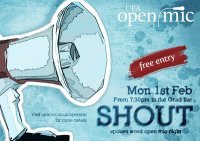
Today, at the UEA Grad Bar Creative Writing Society’s Open Mic Night, I met Tim Clare and John Osborne. I just went right up to them, and introduced myself, and asked if I could ‘have a chat with them’ and it was awesome. Right about now, you are probably wondering who these two guys are and why I am even bothering to tell you I met them, let alone bragging about going up and talking to them. Clare and Osborne are both members of the up-and-coming if not already up, poetry group known as AISLE16. And, if you are doing a big research paper/project on Norwich poetry, with an experiencal bit based on the contemporary poetry scene in Norwich, and you just happened to have discovered Aisle16 via the inter webs just a few nights ago, seen that they had a show in Norwich coming up, and hoped to get a chance to interview them—all of which has happened to me—and then magically, you’re in the Grad Bar listening to your peers then one of them gets up and performs, well you would be just as excited as I am right now to say, “Yeah, I went up and talked to them.”
But a little bit more on Aisle16. The Norwich Arts Centre (NAC) calls them, “the UK’s most sought-after poetry collective.” And this Monday, 8th February at the NAC they will be returning to their hometown of Norwich to perform a show about leaving home and then returning home (hopefully to receive some glory). Having now seen both Clare and Osborne, two of the five members of the group, perform live, I can say they are both comedic and touching, balancing satire with the most poignant sense of adolescent misplacement that we’ve all once felt. Before the show on Monday, I will be interviewing the members (YIKES!) as part of the experience elements of my poetry research project. So keep an eye out for Hometown Glory Part 2: The Interview.
Tags: Megan
What I love about our walking tours is the complete sensory overload that occurs when we set off up and down the streets. Of course, the visual stimuli are wonderful, The Roman Wall, the Tower of London … I could go on and on. But the great thing is that it’s not just visuals. On market day I was able to indulge in the delicate spices wafting through the air from the many food vendors at Acton Market. Also, this entire journey has been made even more enjoyable by the wide selection of tastes I have enjoyed… Wensleydale cheese, Aloo Kachori, Sheppard’s Pie. Yesterday on my Bloomsbury tour I was able to hear some different sounds than I was used to. When we walked past Coram’s Fields I heard the laughter of children and the whooshing of a zip-line inside the playground. This was the complete opposite the church bells pealing and the traffic rushing by that I heard on the Roman Wall tour earlier that morning. The tube is another story altogether. The Brits who ride the underground are silent…. Another one of their “privacy rules” I’ve noticed. If people are talking it’s in another language or it’s one of my classmates. Listening to other languages as I wander around has really made me appreciate London as a global city. Where else can you walk down a side street and hear one man talking in rapid Portuguese on his mobile and hear a woman speaking to her daughter in Farsi within two blocks of each other? My trip out to West India Quay this afternoon only increased my interest in the sounds of this great city.
The Docklands Museum provides a wonderful time line of life by the Thames from pre-Londinium to the present day. In considering London the ultimate melting pot of humanity, this museum manages to incorporate many of the major events of the Docklands history in its three floors. I enjoyed many of the interactive aspects of the museum such as the touch screen information panels, the dark sailor’s alleyway (thanks for going first Brandon!), and the spice boxes. However what really struck me were the audio aids. At every exhibit you were bombarded with snippets of sounds that perfectly blended with the content of the prompts and the visuals. Like many of my classmates, the exhibit on the evolution of slavery in England made a major impact on me. The audio and video that accompanied this section was powerful, arresting and disturbing. I can tell you that the words will stay with me for a long time. As I walked around reading about the Middle Passage, Caribbean plantations and the struggle for Abolition, “YOU WILL BE BEATEN, YOUR CHILDREN WILL BE TAKEN AWAY FROM YOU, YOU WILL LOSE YOUR FREEDOM” kept ringing in my ears. Once I reached the exhibit on the London Blitz, the whispered and paranoid tones of “ Keep it under your hat” and “Loose lips sink ships” had me looking over my shoulder to make sure I was alone.
Take each small moment and observe what is going on around you. At lunch I heard opera music drifting into the back garden, I heard the fire alarm 20 minuets ago, A dog is barking outside right now. Each day I spend here gives me another opportunity to “listen in” and lean about the city of London. I encourage everyone to look up when you walk around, open your window, sit out in the garden, go to a park or a pub.
I read this poem at The Docklands Museum and it immediately made me think of this course.
“The London Breed” by Benjamin Zephaniash (1996)
‘I Love this great polluted place
Where pop stars come to live their dreams
Here ravers come for drum and bass
And politicians plan their schemes,
The music of the world is here
This city can play any song
They come to here form everywhere
Tis they that made this city strong.
A World of food displayed on streets
Where all the world can come a dine
On meals that end with bitter sweets
And cultures melt and intertwine
Two hundred languages give voice
To fifteen thousand changing years
And all religions can rejoice
With exiled soul and pioneers
It’s so cool when the heat is on
And when it’s cool it’s wicked
We just keep melting into one
Just like the tribes before us did
I love this concrete jungle still
With all its sirens and its speed
The people here united will
Create a kind of London breed.’
Tags: Grace · Museums
August 23rd, 2009 · 1 Comment
From the minute we moved into the “London, Sugar, and Slavery” section of the Docklands Museum I think we all knew it was going to be something different; something unlike other things we typically see when at a museum. Being a very visual person I was immediately drawn to a video that began as we entered the area. The film was the reading of a diary of an enslaved African (as the Dockland Museum’s terminology sign stated it would refer to slaves as). Images of different people mouthing the words of his diary flashed across the screen along with other scenic and touristy images of London, as a man’s voice spoke it and the words of the entry scrolled along the bottom. The letter ended with the final words, “someday I hope this will all end, and we will all be free.” I simple wish of a man who could do nothing besides hope for the best in the future.
Keeping that video in mind I strolled through the remainder of the exhibit reading the signs and refreshing my memory of what I have learned about slavery in the past. But when I got to the end of the exhibit I immediately stopped in my tracks. The final wall in this area as entitled “Loss & Liberty” and featured modern ceramic artwork paired with poetry.
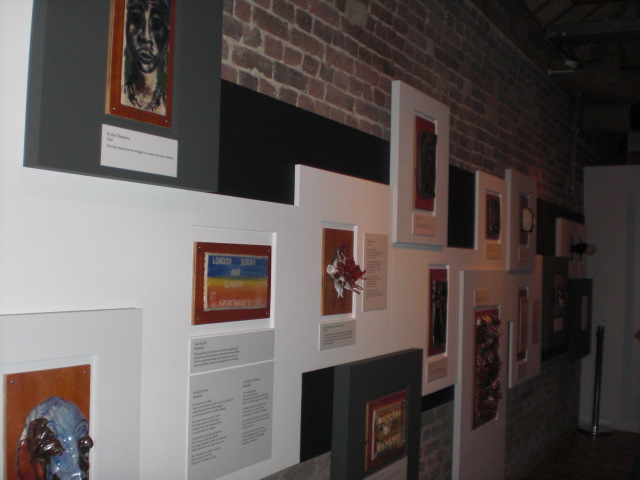
Loss & Liberty
I moved through the artwork and poems slowly, taking in each one as it came. The Caribbean rose, the faces of strained men and women, and the repetition of these images returned my thoughts to the video from the beginning of the exhibit. The repeated modern images and the eloquent words of the enslaved African from the past, paralleled with the ceramics and the words of current men who have experienced, have heard, or are experiencing similar thoughts and feelings as the man did writing in his diary in the 1700s. At that moment the exhibit all came together for me in a world of history, art, and culture all uniting, blurring, and mixing– into one.
To read more about my time in London/UEA and to see more pictures visit: http://amandaepower.blogspot.com/
Tags: Amanda · Museums









